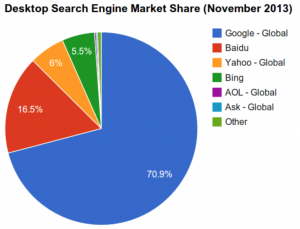
“sociale-media-logos” by Archeduc – Vormingplus Halle-Vilvoorde is licensed under CC BY-NC-SA 2.0
What is“Techclash”?
“Techclash” is a concept created by “The Economist” in 2018, which is used to describe the circumstance of inequality proposed by the public, politicians, and the government to the growing strength and profit of the United States “Big tech”. These companies include Facebook, Apple, Google, Amazon. According to the survey, the number of active Facebook users is currently 2.74 billion, more than one-third of the world population. Google has 70% of the search market share and is the global leader in “paid search” advertising. The influence of Google and Facebook is continuously rising. ((Fitzgibbon, 2021) However, it is also these two globally media platforms has also aroused concerns from society

“Desktop Search Engine Market Share in November 2013” by Oleamm, licensed under the Creative Commons Attribution-Share Alike 3.0 Unported license.
Concerns behind the techclash
- Monopoly market /Unfair competition.
Because Google and Facebook account for a large proportion of the market, they can use their dominant position to formulate the whole market rules, which makes it some small companies that new entries to the market hard to survive. And greatly eliminates the key characteristic of new media: creativity and diversity. This behavior might damage the interests of competitors and also reduces the competitiveness of the industry, which is unexpected. At the same time, ACCC pointed out that Google lacks transparency in advertising pricing and operation in the report, which challenges the advertisers and publishers to understand the operation process of the supply chain, result in finding difficulty in improper behaviors. (2021)However, the regulations under the competition law are not appropriate for this situation, and it will take too long to completely prevent the loss caused by this competition.
- Capitalist-led algorithm recommendation /Filtering bubbles.
It is a normal phenomenon that in search engines the more advertisers invest, the front the advertisements will appear in the search pages. Although these pages or links are sometimes not the result you want or not useful, the advertising revenue is Google’s biggest profit source so far. These contents will inevitably continue to be recommended to you because of the impact of the capitalist economy on the Internet. But it was contrary to the original idea of the Internet that sharing information among free public communities This makes many users worry about the algorithms may disturb their rights. Besides, on the other hand, Elis Pariser published a book in 2011, and there’s a term called the filter bubbles, the main function is the system will constantly recommend content you may like or interest in to encourage users to have a habit of using the Internet. The page that you don’t search frequently has been filtered out by the algorithm so that you can only browse the content you want. In this case, some people start to concern about users’ privacy are stolen and feel insecure about their personal information, which is also a challenge that all media platforms are facing.
- Hate speech/ Cybercrime.
The Internet provides a platform for users around the world to speak without strict restrictions and people have great freedom to express their views on the Internet. However, these freedoms have contributed to some people’s criminal behavior. For example, given a voice to spread hate speech ,intent malicious and online harassment. This is what exactly Mark Zuckerberg questioned during Congress. The Internet’s concern about the ability to manipulate algorithms for political campaigning, misuse of personal data, online abuse, and harassment of women and minorities (Flew, 2018) Cybercrime will directly interfere with users’ physical and mental health. Some platforms even sacrifice the user’s experience to gain more profits and encourage clicking on some bait and virus websites to spread misleading information. (Berners-Lee, 2020)These behaviors, both from the platform and individuals, cultivate fertile soil for the growth of cybercrime.

Credit: QuoteInspector/CC BY-ND 4.0
Solutions
To solve this tough issue, we need multi-party cooperation. The power of governance of one party cannot perfectly deal with or relieve some pressure. This requires us to come up with solutions from three aspects: government, individuals or social organizations, and technology companies.
Technology companies (self-regulation)
First of all, it is suggested that we can start with self-regulation inside the technology companies. Each company has a better understanding of own company’s situation and problems, which can target the problems more accurate that means will carry out solutions faster and more efficiently to protect the right of consumers to the greatest extent, to avoid the loss of consumers. This is also the responsibility that every company should take to society. They can work out a more practical and effective plan for the current business and technology. Under this background, the goals set by internal supervision are easier to achieve. However, there is another question rise from the internal regulation which is that will the company can regulate itself fairly? Because of the governance of these behaviors, they often hurt the interests of companies. Balancing public value and self-interest will inevitably favor self-interest, and it is difficult to achieve fair and just supervision. Therefore, in the absence of external intervention or incentive mechanism, it is difficult to change inside the company.
Government regulation
On the other hand, government regulation should be the most powerful scheme among all supervision methods. As we know, laws have a complete and reasonable external system from formulation to implementation, the balance of justice will not favor any party, its restraint effect is the most effective. However, there are some drawbacks. There may be some differences between the existing laws and the existing problems. It takes a lot of time to enact new laws. When the new regulatory treaty comes down, a new round of investigation will be needed for the internal situation of the company. Overall, it takes too long to solve the problem in time. Moreover, the Internet is in an era of globalization, new media platforms are used across nations. According to the national background of each country, the regulation laws of technology companies are different, it is hard to achieve transnational regulation. For example, The Cybersecurity Law of the People’s Republic of China, promulgated by China in 2016, promoted the healthy development of economic and social informatization and filled the previous vacancy in China’s regulation of cybersecurity. However, this law only applies to China. (2021)
Individuals or social organizations
Finally, from the perspective of individuals and social organizations, in the process of participating in supervision, citizens’ awareness of protecting rights can be constantly improved. And users are the foundation of technology companies, their opinions can be promoted to organize the society to regulate the company. It can stimulate the company aware of the necessity of supervision as well. However, the personal ideas and suggestions could not be fully adopted by the company, more is to provide a kind of inspiration for supervision, and it needs the cooperation of all sectors of society to put them in place.
Conclusion
Facing the phenomenon of different concerns that arise from the techclash in society, it is necessary to solve them in various ways. Each aspect of supervision has its own advantages and disadvantages. The wisest way is for the whole society to cooperate together to solve these problems comprehensively.
GROUP: TUT 08
References:
The Economist Newspaper. (2018). The techclash against Amazon, Facebook and Google- and what the can do. The Economist.Retrieved October 14, 2021, from https://www.economist.com/briefing/2018/01/20/the-techlash-against-amazon-facebook-and-google-and-what-they-can-do.
Fitzgibbon, A. (2021).Digital Dominace: the rise and rise of Google and Facebook. University of London. Retrieved 14 October 2021, from https://london.ac.uk/news-opinion/london-connection/feature/digital-dominance-rise-google-facebook.
ACCC (2021).Google’s dominance in ad tech supply chain harms businesses and consumers. Retrieved 14 October 2021, from https://www.accc.gov.au/media-release/google’s-dominance-in-ad-tech-supply-chain-harms-businesses-and-consumers.
Pariser, E. (2011). The filter bubble: what the Internet is hiding from you. Penguin Books.
Berners-Lee, Tim (2020), “30 years on, what’s next # ForTheWeb”, https://webfoundation.org/2019/03/web-birthday-30/
Flew, T., 2018, ‘Platforms on Trial’,Intermedia 46(1), pp.16-21
China’s Cybersecurity Law: Personal Information Protection Overview | Protiviti – Australia. Protiviti.com. (2021). Retrieved 15 October 2021, from https://www.protiviti.com/AU-en/insights/pov-personal-information-protection-overview.
TED Talks (2018)Breaking the Monopolies of Facebook, Google, and Amazon https://www.youtube.com/watch?v=k4m-phHynmE

